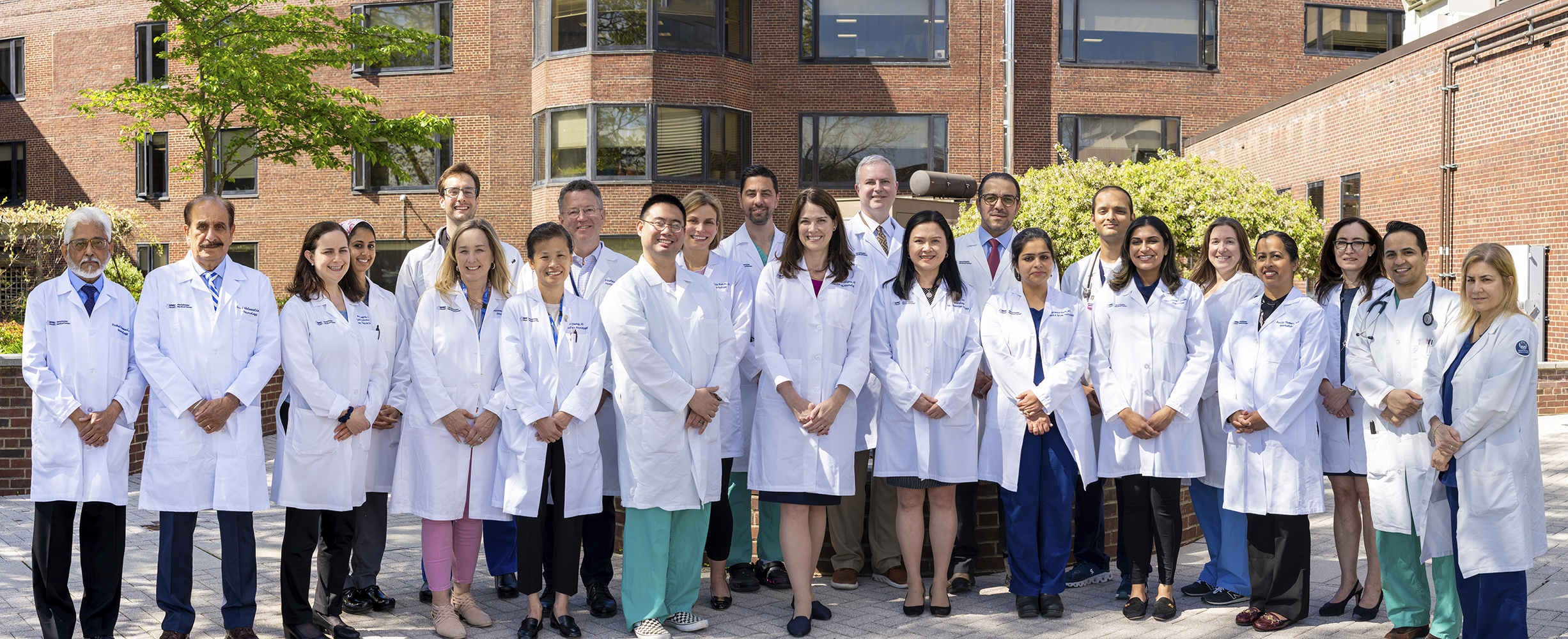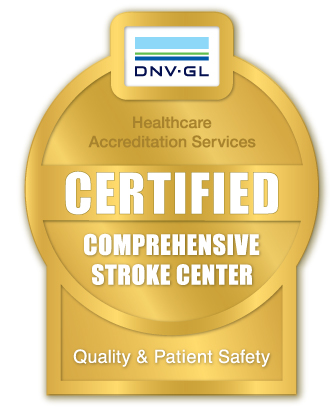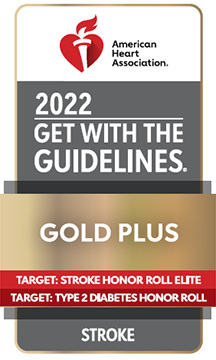Neurology Department at Westchester Medical Center
The Department of Neurology is comprised of multi-disciplinary teams of clinical experts that provide comprehensive neurological care for a wide range of neurological disorders affecting the brain, spine, nerves, and muscle. The conditions we treat range from neurologic emergencies, such as acute stroke or status epilepticus, to more chronic conditions such as headache/pain syndromes, epilepsy (seizures), neuromuscular (neuropathy, myasthenia gravis, muscular dystrophy), neuroimmunological (multiple sclerosis), as well as neurodegenerative (dementia) and movement disorders (Parkinson’s disease). All divisions are directed by highly qualified sub-specialists.
Compassionate Care and Excellent Outcomes
We seek to provide our patients with compassionate care and excellent outcomes while advancing current standards of care through clinical research. We emphasize effective and open communication with our patients and referring physicians.
Our physicians are supported by dedicated physician assistants, nurse practitioners, registered nurses, therapists, psychologists and social workers. The Neurology Department partners closely with other departments at Westchester Medical Center, including:
- Neurosurgery
- Radiology
- Emergency Medicine
- Internal Medicine
- Psychiatry
- Neuropsychology
- Neuropathology
- Social Work
- Chronic Pain Management.

Download our Seminar on Parkinson's Disease and Other Movement Disorders presentation:
Subspecialties and Conditions Treated
The following specializations distinguish the Neurology Department at Westchester Medical Center.


The Comprehensive Stroke Center at Westchester Medical Center
We are proud to be the only hospital in New York’s Hudson Valley region recognized by the New York State Department of Health as a Comprehensive Stroke Center.
The Center is dedicated to rapid intervention in the management of acute stroke and to the study of new and effective treatments. Our mission is to provide expeditious care to patients with acute strokes to limit stroke-associated brain damage.
In 2022, the Center earned the prestigious American Heart Association/American Stroke Association's Get with the Guidelines® Stroke Gold Plus Quality Achievement Award as well as the Target: Stroke Honor Roll Elite and Get with the Guidelines Target: Type 2 Diabetes Honor Roll.
The care we provide is multifaceted and our team is comprised of stroke experts such as emergency medicine physicians, vascular neurologists, neurointerventionalists, neuroradiologists, and neurointensivists. Working together, our highly synchronized team strives to facilitate the highest quality care for cerebrovascular disease.
Using advanced rapid diagnostic technology, such as tele-stroke, we can extend our expertise to distant sites miles away. Upon arrival to one of our sites, our RAPID CT perfusion technology allows us to quickly identify patients who are beyond the conventional therapeutic windows for neurointerventions. Finally, WMC is the first site in the country to utilize the FDA approved robotic transcranial doppler monitor for patients with subarachnoid hemorrhage.
Learn more
Neurocritical Care
Westchester Medical Center is home to a leading Neurointensive Care Unit under the leadership of Stephan A. Mayer, MD, an internationally recognized pioneer in the field of neurocritical care. Our 19-bed neurological intensive care unit is staffed by a dedicated team of neurointensivists, advanced practice providers, and nurses specialized in the care of patients with complex neurological diseases. The unit features emergency “mobile ICU” transport via helicopter or ambulance, advanced multimodality brain monitoring, RAPID perfusion imaging, and much more. For more information on our capabilities and expert services, visit the Neurointensive Care Unit at Westchester Medical Center online.
Learn More
The Epilepsy Center
The epilepsy program at Westchester Medical Center is growing with a faculty of neurologists, neurosurgeons, and neuropsychiatrists who specialize in the treatment of seizures and epilepsy.
Westchester Medical Center is the only certified Level 4 Epilepsy Center in the Hudson Valley that is accredited by National Association of Epilepsy Centers (NAEC) and offers both adult and pediatric treatment. Our highly skilled epileptologists offer expertise in the newest seizure medications, treating epilepsy through pregnancy, neuromodulation, and surgical evaluation. Our neurosurgical team specializes in a variety of surgical treatments as well, including vagus nerve stimulation, robotic depth electrode placement, MRI-guided laser ablation, and neurostimulation.
Learn More: Adults
Learn More: Pediatrics
Learn More: Functional Neurosurgery and Epilepsy Surgery Program
Movement Disorders / Parkinson's Disease
The Division of Movement Disorders provides patients with exceptional neurological and neurosurgical care for Parkinson’s disease and a wide range of movement disorders
WMC Headache Specialists Center
We provide comprehensive care for patients with challenging complex cases of chronic headache. Led by experts in the fields of Medicine, Neurology, Pain Management and Psychiatry, WMC is able to provide comprehensive care to patients with intractable disabling pain, including BOTOX® treatment.
Learn More
Peripheral Nerve
The Peripheral Nerve Program at Westchester Medical Center offers multidisciplinary subspecialty care for individuals with injuries or conditions affecting the nerves of the body outside of the brain and spinal cord. Surgeons treat traumatic nerve injuries, tumors of the peripheral nerves, nerve compression and entrapment syndromes, and an extensive array of other nerve-related conditions.
Learn More
Memory Disorders
Neurologists at Westchester Medical Center, MidHudson Regional Hospital, and WMCHealth Physicians in Poughkeepsie provide care for individuals suffering from memory disorders and related conditions, including dementia, vascular dementia, Alzheimer’s disease, and encephalopathy.
Neuromuscular Disorders
Specialists at WMCHealth Physicians provide care for a full range of neuromuscular disorders, which affect the nerves responsible for voluntary muscle movement and the relay of sensory information to the brain. Physicians evaluate and diagnose patients experiencing muscle weakness, muscle loss, movement difficulties, issues with swallowing or breathing, numbness, tingling, pain, and other symptoms. Care is available for individuals diagnosed with a wide range of pathologies, including muscular dystrophy, multiple sclerosis, amyotrophic lateral sclerosis (ALS), and other diagnoses.

Westchester Medical Center is recognized by the Muscular Dystrophy Association as a top healthcare institution. As an Care Affiliate, we are proud to offer adult patients with muscular dystrophy, ALS, spinal muscular atrophy and other neuromuscular diseases improved access to expert multidisciplinary care, clinical trials, and connections within the neuromuscular community. To schedule a neuromuscular disease consultation, call 914.345.1313.
Neurodegenerative and Movement Disorders
Neurologists specializing in this area focus on care and management of adults with Alzheimer’s Disease, neurodegenerative dementia, treatable dementia, Parkinson’s Disease and other degenerative diseases.
Neuroimmunology and Multiple Sclerosis
We offer comprehensive care to patients with multiple sclerosis and related conditions such as neuromyelitis optica, transverse myelitis, optic neuritis and other neuroimmune disorders.
Balance and Vestibular Disorders
The Balance Center at Westchester Medical Center offers comprehensive evaluation and intervention for those experiencing dizziness, vertigo and chronic balance problems due to neurological disorders. In some cases, these symptoms can be debilitating and result in severe disabilities and impairment in quality-of-life.
Learn More
Traumatic Brain Injury and Neuro-Trauma
Direct trauma to the brain requires careful and dedicated care often involving a lengthy course of rehabilitation. At Westchester Medical Center, as a Level I Trauma Center, we provide care across the spectrum of the patient’s needs, ranging from the emergent neurosurgical and Neurocritical care phase to the acute and subacute rehabilitation phases of care.
Sleep Center
The Sleep Center at Westchester Medical Center offers consultative services for diagnosing and treating sleep disorders.
Learn More
Pediatric Neurology
Maria Fareri Children’s Hospital at Westchester Medical Center offers a full spectrum of care for children afflicted with acute or chronic neurological disorders.
Learn More
Neuroradiology Imaging
Neuroradiology imaging services are available through specialists at Westchester Medical Center, WMCHealth Physicians Neurology, and the Ambulatory Care Pavilion at 100 Woods Road. Comprehensive diagnostic and therapeutic services are available across this network of providers; services include MRI, CT scan, myelography, and more. Neuroradiology imaging may be a critical component of treating back pain, headache, stroke, dementia, cerebral aneurysm, head and neck tumors, head and neck vascular disease, and other conditions.
Concussion Program
One of the tricky things about concussions is that they can be subtle and difficult to diagnose. Until recently, concussion screenings were subjective and sometimes unreliable. Even high-quality diagnostic tools haven’t been entirely reliable. “Many people with concussions have normal CT and MRI scans,” Dr. Gitlevich says.
Recently, the Food and Drug Administration (FDA) approved two serum biomarkers for brain concussion testing. A new technology called Quicktome allows more precise diagnosis of concussion. Quicktome is an AI-powered connectomic analysis platform that provides clinicians with detailed insights into patient-specific brain networks and function. The new Concussion Program at WMCHealth is one of three centers that has access to this technology.
What Should I Expect if I Have a Concussion?
If you are diagnosed with a concussion, you need immediate treatment. “An early diagnosis is key to better treatment outcomes,” Dr. Gitlevich notes. “If a concussion is not properly addressed, you may develop chronic symptoms that are more difficult to treat.”
Concussions can affect various aspects and functions of the brain, including cognitive function, vision, motor skills, and balance. That’s why WMCHealth’s Concussion Program offers a comprehensive and multi-disciplinary approach upon diagnosis. Your care team may include:
- Neuro-ophthalmologist
- Neuro-otologist
- Neuropsychologist
- Neurologist
- Neurosurgeon
- Physical therapist
- PM&R (physical medicine and rehabilitation) physician
These professionals will provide specialized services based on your needs. For instance, if you have vision issues, you will likely have vision therapy. If you have balance problems, you may have a combination of physical therapy to build muscle and vestibular therapy to help with stability.
“Our goal is to have all treatment modalities help you return to normal life as soon as possible,” says Dr. Gitlevich. The WMCHealth team can accomplish this goal by continually tracking your progress with the newest technology available–Quicktome.